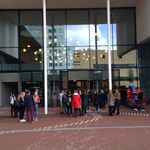Polarization and conflict in democratic societies
AMCIS lunch lecture
- Date
- 22 March 2024
- Time
- 11:00 -14:00
- Room
- B5.12

Our guests are both professors of Political Science, but have published widely on topics that are not only relevant to political scientists, but also sociologists, geographers and (political) economists. Jonathan Rodden has extensively studied political and economic geography, but also worked on participation and social networks, and on public health, for example. Jennifer Fitzgerald worked, among other topics, on social cohesion and voting behaviour, on generational inequalities in political preferences, and on political socialization within families.
About the seminar
The seminar is organised in two sessions with lunch in between provided for all participants. In each session, the our guest will present their ongoing work for 20-30 minutes which will be followed by a 10-minute discussion by an assigned discussant and 20-30 minutes of Q&A and discussion with the audience. There is no need for participants to prepare or read papers in advance. We believe that this could be an interesting and inspiring event for many of our colleagues in a variety of social science disciplines at the UvA.
Program
- 11.00-11.50: Session 1
Presenter: Prof. Jonathan Rodden, Department of Political Science, Stanford University
‘Within-party heterogeneity and affective polarization in the US and Europe’
In the literature on polarization, it is axiomatic that hostility and negative affect between groups is heightened by within-group homogeneity. However, this paper argues the opposite for political parties in democracies: when voters are risk-averse, negative affect toward out-parties should increase with their internal heterogeneity. We use cross-country data from the Comparative Study of Electoral Systems to demonstrate that voters in countries with more heterogeneous parties exhibit greater levels of affective polarization; and, within countries, voters express greater negative affect toward more heterogeneous out-parties (distance held constant).
Discussant: Eelco Harteveld
- 11.50-12.40: Lunch
- 12.40-13.30: Session 2
Presenter: Prof. Jennifer Fitzgerald, Department of Political Science, University of Colorado Boulder
“I can imagine breaking the law even if other people are harmed” Support for political violence in democratic societies
Questions of who supports political violence in democratic societies and why have received significant scholarly attention in recent years. We explore the role of feelings of belonging as they relate to support for violent political actions. Integrating cross-national European survey data with detailed panel survey data of young Swedes over time, we ask whether belonging to one’s country, region, town, neighborhood and family has implications for accepting political violence as a strategy. We find that individuals with very weak feelings of belonging are especially likely to support and envision taking part in political violence. Our results buttress psychological theories of belonging’s benefits in terms of staving off extremism and promoting peaceful pursuit of political objectives. We also show that the Swedes in our survey who are most likely to say that they can imagine breaking the law even if other people are harmed tend to hold political attitudes that are on the political right and often end up engaging in political violence, themselves.
Discussant: Sarah de Lange
